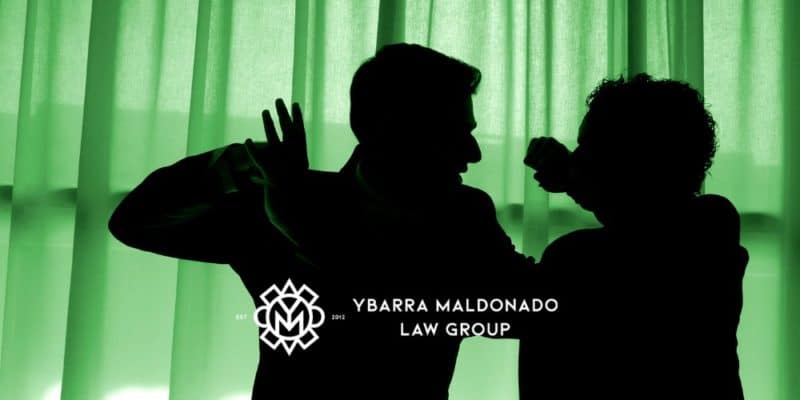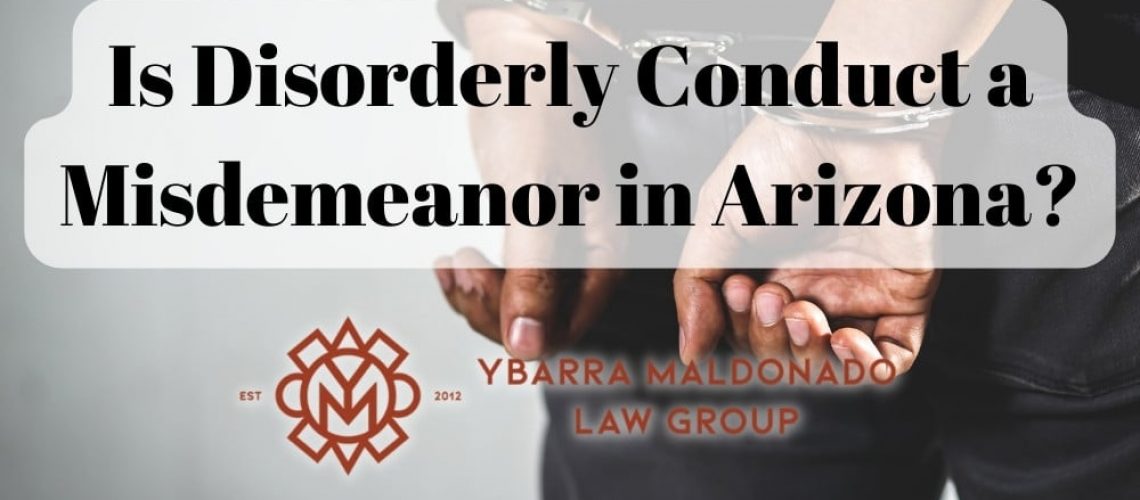In order to ensure a safe, calm, and peaceful community, state and local governments make laws that limit certain actions. Disorderly conduct laws dictate what conduct might cause a disturbance of the peace. When someone engages in disorderly or threatening conduct, they are “breaching or disturbing the peace.” While these charges can be common in situations where people gather in large groups, many disorderly conduct cases are completely unfounded. If you’re facing a disorderly conduct charge in Arizona, you need an experienced criminal defense lawyer on your side.
At Ybarra Maldonado Law Group, we understand that being charged with a crime can lead to serious consequences for your future. And, disorderly conduct charges are among the most commonly-issued charges by law enforcement.
However, many of those charged with disorderly conduct are arrested and charged without much substantial evidence against them. Police sometimes use the charge too often, as they interpret it as a catch-all charge for a multitude of different circumstances. If you are facing criminal charges, call the Phoenix criminal defense lawyers at YMLG today. Contact us at 602-910-4040 to schedule your appointment.
What Is Disorderly Conduct?

All states have their own laws about what is considered disorderly conduct. However, there is much overlap between each state’s laws.
Generally speaking, actions that constitute disorderly conduct tend to either cause a disturbance of the peace or ultimately lead to non-peaceful events in a public place. These charges are more common at events or in areas where there are many people who are intoxicated.
Disorderly conduct is typically defined by the circumstances surrounding it, the objectivity of the prosecutor, and the location of the conduct.
Circumstances Surrounding the Behavior
The circumstances of disorderly conduct charges are extremely important.
In many cases, certain actions are not considered disorderly unless they occur at a certain time or in a certain place.
For example, let’s say someone is drunkenly wandering a neighborhood at 3 AM in the morning. If the person makes unreasonable noise, shouts abusive language, or even engages in public urination, this could warrant a drunk and disorderly charge. Being noisy and loud in the middle of a busy city would likely not warrant the same charge.
The Objectivity of the Prosecutor
It isn’t always necessary for a prosecutor to show that someone else was bothered by the accused person’s conduct. These criminal charges need only show that a reasonable person would have been bothered by the conduct. Therefore, it is not difficult to apply these charges to a variety of situations.
Location of the Behavior
Certain states specify that disorderly conduct in a public place is illegal, while others do not specify at all.
In the past, courts have ruled on disorderly conduct charges occurring during peaceful protests, a religious ceremony, in a dressing room, and in a variety of other public places. Even buildings in which people live can be locations for disorderly conduct. If the conduct affects neighbors within the building, this could satisfy the “public” element.
Disorderly Conduct in Arizona
Like many other state and local governments, Arizona has its own disorderly conduct statute. It outlines what actions constitute a disorderly conduct arrest, as well as the requirements for the prosecutor to prove their case. Below, we include an outline of the disorderly conduct laws in Arizona.
ARS 13-2904
According to Arizona law, disorderly conduct includes the following acts.
Someone intends to commit a breach of the peace in a neighborhood, of a family, or of a person. Additionally, they must have knowledge that they are engaging in such conduct.
Prohibited conduct includes:
- Engaging in violent behavior, fighting, or highly disruptive actions
- Making unreasonable noise
- Using offensive or abusive language
- Gesturing to another person in a way that is likely to provoke violence or retaliation
- Making a drawn-out commotion or display with the intent to disturb events around them
- Refusing to obey orders to disperse that are issued to maintain public safety and public order in the event of a fire or other emergency
- Recklessly handling a deadly weapon
When Are People Charged with Disorderly Conduct?
The most common situations in which disorderly conduct arrests happen are when people start fighting or engaging in a public disturbance. Other locations where it is common to see these arrests are in areas of nightlife in cities.
When people drink too much or get into an argument with another person in a public place, this could constitute a criminal charge. Sometimes, the police just arrest everyone involved without properly investigating the situation. This leads to innocent people facing penalties or jail time for crimes they did not commit.
What Happens After Someone Is Arrested for Disorderly Conduct?
After an arrest, the defendant may spend the night in jail and see a judge the next day. If the judge determines that the person in question may not return to the location where they were arrested, they may be barred from re-entering their own homes. This is a common condition of release for judges to apply, but it can often disrupt a person’s life.
However, working with a Phoenix violent crimes attorney can allow someone to modify the conditions of their release. While this is a good option, it may take several days before the judge makes the change. During that time, the defendant will need to find another place to stay.
If there is no domestic dispute to address, a judge likely will not apply this release condition. After the accused person’s release, they will receive another court date. This first court date will be an arraignment, which essentially is just the judge asking the defendant how they plea and explaining the sentencing.
Penalties for Disorderly Conduct in Arizona
There are two types of disorderly conduct charges in Arizona. There are felony disorderly conduct charges and misdemeanor disorderly conduct charges. Most are classified as a class 1 misdemeanor crime. Keep in mind that the statute of limitations Arizona must not pass before the defendant is charged.
However, those that involve the use of a firearm or deadly weapon are a class 6 felony. Read our blog about important Arizona gun laws to learn more.
Below, we outline the potential penalties for both a felony and a misdemeanor charge.
Class 1 Misdemeanor
- Range of 0 days in jail to 6 months in jail
- Fines up to $2,500
- Up to 3 years probation
- Community service requirements
Class 6 Felony
- Mandatory minimum 1.5-year prison sentence for a first offense
- Presumptive term of 2.25 years in prison
- Maximum 3-year prison sentence
- Prior convictions could heighten the sentencing for this charge.
If you are charged with a Class 6 felony in Arizona, you need a Phoenix Class 6 felony lawyer with our firm. We can help you craft an effective defense and research the facts of your case to protect your rights and freedoms.
What Are Common Defenses for Disorderly Conduct?
Regardless of the commonplace nature of these charges, they should not be taken lightly. Experienced criminal defense attorneys understand that even minor charges can greatly affect someone’s future. That’s why you and your attorney should explore all possible options in terms of crafting your defense.
Reasonable Doubt
When a person commits a crime, it is up to the prosecutor to prove beyond a reasonable doubt that the defendant actually committed the crime in question. If you and your attorney can establish reasonable doubt, this will greatly help your defense. This involves gathering evidence, cross-examining witnesses, and gathering testimony that supports your case.
Violation of Civil Rights
Suppose the police officer fails to read your Miranda rights or follow the appropriate procedure. You could claim that they violated your civil rights. When police officers fail to follow required procedures, you and your attorney can raise this as a defense.
Other examples include lacking a warrant, lacking probable cause, and lacking reasonable suspicion.
Self-Defense
Maybe you were simply trying to protect yourself, someone else, or your property. Acting in defense of yourself or others is a valid defense. Many people do things as a form of self-defense that they wouldn’t normally do unless they felt like they were genuinely in danger of immediate harm.
Freedom of Speech
The First Amendment protects the right to free speech in the United States. The Constitution defends most types of speech, excluding what we call “fighting words.” Fighting words are those that intend to incite a breach of the peace. The Constitution does not protect fighting words. If you were arrested for disorderly conduct based on your speech, you could use the freedom of speech as a defense as long as you did not use fighting words.
Improper Mental State
Sometimes, certain medications or substances can cause people to act in ways that they normally would not. Additionally, diagnosed or undiagnosed mental illness could lead to disorderly conduct. These are valid defenses, as people sometimes don’t even realize they’re causing a disturbance.
Other defenses exist for disorderly conduct aside from those listed above. Speak with your Phoenix criminal defense lawyer about the defense strategies available in your case.
Do I Need a Lawyer for a Disorderly Conduct Charge in Arizona?
If you face arrest for disorderly conduct, Ybarra Maldonado Law Group is here for you. We offer criminal defense in Arizona for those charges with a multitude of different crimes, including theft crimes, violent crimes (those that may result in serious bodily injury), and other crimes. To receive only the best in criminal defense, we invite you to schedule a consultation with us. Call today at 602-910-4040 to establish an attorney-client relationship with us. Any confidential or sensitive information that you share with us will remain confidential.


